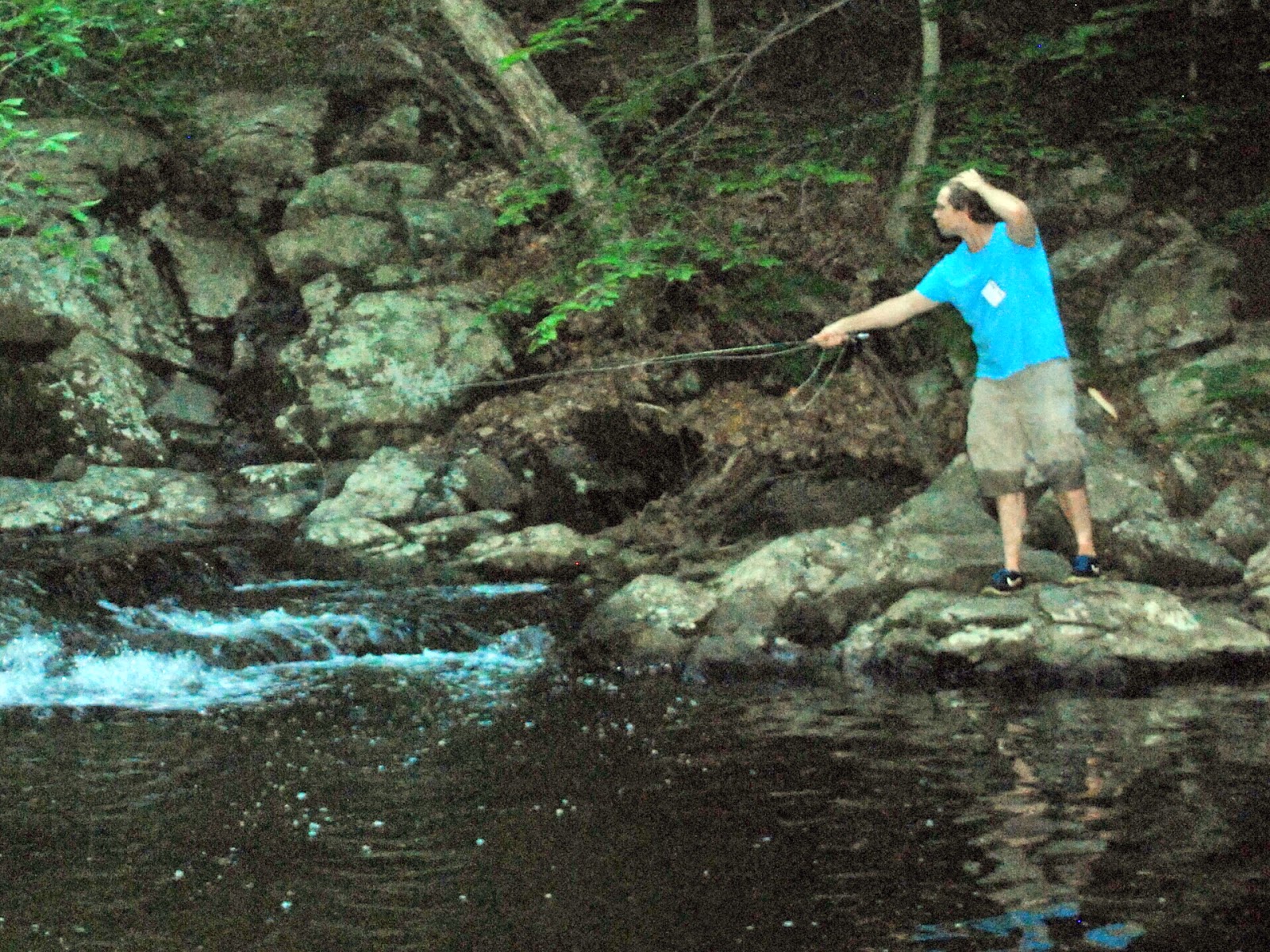Fly
fishing for Highlands rainbows and browns good into June
X out the browns in NJ, unless you intend to fly fish wild trout. This is a story published a while back in print.
For 39 years now, a brother and I
have occasionally fished streams in New Jersey's Hunterdon Hills from just north of
Lambertville to Milford—Wicecheeochee Creek, Alexauken Creek, Locatong Creek,
Nishisakawick Creek—all of them as beautiful as their Lenape names, names more
complicated, perhaps, than Latin entomological terms. However, none of these
streams have wild trout, except the Hakihohake Creek further north in Milford,
although a very few trout have been known to holdover.
Trout escaping capture after stocking
survive at least into June, and their numbers are significant enough to provide
an interesting fishery. In 1978, a friend and I fished the Locatong the way we
typically caught hatchery rainbows: 3 ½-foot spinning rods, two-pound test line,
and weightless salmon eggs. Nearly June, the streams hadn’t been
stocked for a couple of weeks or more, and although no browns swam with what remained,
we weren’t doing well. We followed the stream a fair distance from the parked
truck and saw a fly fisherman at the pool we intended to fish, where the
current meandered into an elbow bend.
Both of us fixed by a shared
fascination, we stood and watched as the man bent to unhook and release a trout.
A minute later he was into another. We sat and took a break, watching
unrelentingly. The air was quiet and seemed to suspend light like mist. A few
insects shifted about erratically, illuminated.
It became abundantly clear that the
rainbows had got away from susceptibility to hatchery pellet look-alikes, such as salmon eggs.
All I could think was how dandy fly fishing worked way better than our proven
method. It’s an incident I’ll never forget because it improved my respect for
these otherwise all too gullible hatchery trout.
The Locatong among Hunterdon’s very
appealing streams, this was a perfect place to see fly selectivity happen,
because every time I return to these fair size and smaller creeks flowing to
the Delaware River, it seems as if they’re more special than merely being put
and take waters. The Locatong has smallmouth bass, but all of these streams
have always impressed me more as trout water, and I like to imagine that hidden
here and there under currents sometimes plummeting over falls, sometimes
slugging through stretches, are a few springs rare holdover trout find in the
summer and dwell near.
Even Stony Brook in Mercer County has a few cold water springs. I’ve seen August trout congregated in a shallow emission. The same friend who watched the fly fisherman with me has caught such trout—very few!—in the Wickecheoke and Locatong during January. They’ve never been stocked in the fall.
Even Stony Brook in Mercer County has a few cold water springs. I’ve seen August trout congregated in a shallow emission. The same friend who watched the fly fisherman with me has caught such trout—very few!—in the Wickecheoke and Locatong during January. They’ve never been stocked in the fall.
Given trout stocked in spring surviving
into January, the prospects for May and June may seem considerably better. Mayfly,
caddis, and drake hatches may occur, but all you may need are Adams in various
sizes and some dry ants to provoke response. It’s not a bad idea by any means
to observe just what duns are emerging, if any do, or what spinner falls may
bring rainbows chasing, and reach for a wide and expensive selection of
patterns to try and imitate the bugs, yet more important than pattern is size,
especially for rainbows that aren’t quite wild and as selective.
This year, I bought a six-foot, two-weight, Temple Fork Outfitters fly rod, and balanced it with a Ross Fly Rise 1
reel. I thought I would spend some money in hopes that I find time for years
ahead on some very small wild trout waters in the Highlands. I’ll use it on the
North Branch Raritan also, but here an eight-foot, five-weight, rod does well, as it
would on streams like the South Branch Raritan, Musconetcong, Paulinskill,
Rockaway, Ramapo, Pequest, and Pequannock.
I can just imagine approaching Ken
Lockwood Gorge with this set up, tiny sulfur tied to a 7X tippet, and hooking
one of the big ones. The trout would race with the plummeting current and strip
loose like a kite on a thread.

No comments:
Post a Comment
Comments Encouraged and Answered